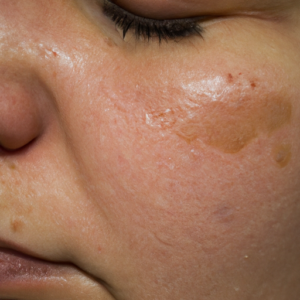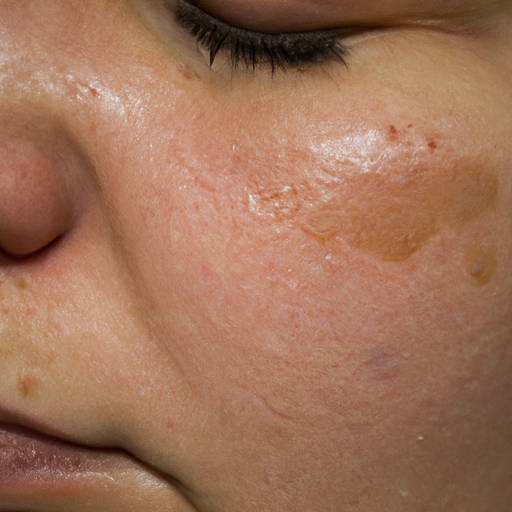Get Clear Skin: Understanding Acne and Hyperpigmentation
Hey there, folks! If you’re someone who struggles with acne and you’re also dealing with hyperpigmentation, you’ve come to the right place. In this post, I’ll be breaking down everything you need to know about these two skin concerns and how to treat them. Let’s dive in!
First off, let’s define what acne and hyperpigmentation are. Acne is a skin condition that occurs when your hair follicles become clogged with dead skin cells and oil. This can cause pimples, blackheads, and whiteheads. Hyperpigmentation, on the other hand, refers to when patches of skin become darker than the surrounding area. This can be caused by a variety of factors, including sun damage, hormonal changes, and inflammation.
Now that we’ve got that out of the way, let’s take a closer look at acne. There are a few different things that can cause acne, such as hormones, genetics, and stress. The type of acne you’re dealing with can also vary, from mild whiteheads to more severe cystic acne. It’s always a good idea to talk to a dermatologist to determine the best course of treatment for your specific type of acne.
As for hyperpigmentation, this can be caused by a range of factors. For example, if you pick at your acne or use harsh skincare products, you may be more prone to developing hyperpigmentation. Additionally, sun exposure can exacerbate existing hyperpigmentation and create new dark spots.
What’s the Deal with Acne?
As someone who has struggled with acne, I know how frustrating it can be to deal with. Acne is a skin condition that occurs when hair follicles become clogged with oil and dead skin cells, leading to pimples, blackheads, and whiteheads. It’s a common skin problem that affects people of all ages, but especially during adolescence when hormones are in flux.

The causes of acne can vary, but some factors that may contribute to its development include genetics, hormone imbalances, and certain medications. Some people may also experience acne due to their diet or lifestyle habits, such as consuming too much dairy or not washing their face regularly.
There are different types of acne, including mild, moderate, and severe. Mild acne may only show a few pimples or blackheads, while severe acne can cover the entire face, chest, and back. It’s essential to determine what type of acne you have to effectively treat it.
What the heck is Hyperpigmentation?
So, you know acne can leave some pesky blemishes behind, but have you heard of hyperpigmentation? Let me break it down for you. Hyperpigmentation is when areas of your skin darken due to an excess of melanin, which is what gives your skin its color. It can be caused by a variety of things such as sun exposure, hormonal changes, inflammation, and, you guessed it, acne. When you have acne, your skin is inflamed and irritated, which triggers your body to produce excess melanin, leading to hyperpigmentation. These dark spots can be difficult to get rid of and can leave you feeling self-conscious about the appearance of your skin. But don’t worry, there are ways to treat hyperpigmentation and get your skin looking bright and clear once again. Check out this article from Brightside Beauty for more information on how to banish hyperpigmentation caused by acne.
Does Acne Cause Hyperpigmentation?
Hey guys, it’s me again! Today we’re talking about whether or not acne can cause hyperpigmentation. As someone who has struggled with acne for years, this is a topic that hits close to home for me. So, let’s get into it!
First of all, the answer is yes, acne can absolutely cause hyperpigmentation. Hyperpigmentation is a common side effect of acne, especially for those with darker skin tones. When your skin experiences inflammation, it can produce excess melanin which leads to dark spots or patches on the skin.
In my personal experience, I have dealt with hyperpigmentation from acne for years. Every time I would get a pimple, it would leave a dark mark on my skin that would take weeks or even months to fade. This can be frustrating and disheartening for anyone who is dealing with acne.
So, what can you do about it? Well, there are a few things that can help. First of all, it’s important to treat your acne in order to prevent further hyperpigmentation. This means using products or seeing a dermatologist to develop a personalized skincare routine.
In addition to treating your acne, there are also products and treatments that can help fade hyperpigmentation. Look for ingredients like vitamin C, niacinamide, and kojic acid which are known to brighten and even out skin tone.
Overall, while acne can definitely cause hyperpigmentation, there are ways to prevent and treat it. Don’t let dark spots and patches discourage you in your journey to clear skin!
Tackling Acne and Banishing Hyperpigmentation
After identifying the root causes of acne and hyperpigmentation, the focus now turns to treating them effectively.
As someone who has struggled with both acne and hyperpigmentation for years, I have tried numerous treatment options with varying degrees of success. It’s important to note that what works for one person may not work for another, but here are some common treatments that have proven to be effective:
1. Topical Treatments
Topical treatments, such as benzoyl peroxide, salicylic acid, and retinoids, are often the first line of defense against acne. These medications work to unclog pores, reduce inflammation, and prevent new acne from forming. For hyperpigmentation, topical treatments usually contain ingredients like hydroquinone, kojic acid, or vitamin C, which help to lighten existing dark spots. However, it’s important to use these treatments as directed and start with a lower concentration to avoid irritation.
2. Oral Medications
In some cases, oral medications like antibiotics or spironolactone may be prescribed to treat severe acne. For hyperpigmentation, medications like tranexamic acid or oral contraceptives (for hormonal pigmentation) may be recommended. These options should be discussed with a healthcare professional before starting, as they can have side effects.
3. Chemical Peels
Chemical peels involve applying an acid solution to the skin, which helps to exfoliate the top layers and improve skin texture and tone. For hyperpigmentation, peels containing alpha-hydroxy acids or beta-hydroxy acids can be effective at reducing the appearance of dark spots. It’s important to have a trained professional administer the peel to avoid complications.
4. In-Office Procedures
For more stubborn cases of acne and hyperpigmentation, in-office procedures like microneedling or laser therapy may be recommended. These procedures work by stimulating collagen production and resurfacing the skin, respectively. While they can be more expensive and require more downtime than other treatments, they can provide dramatic results.
Ultimately, finding the right treatment plan for acne and hyperpigmentation requires some trial and error. It’s important to be patient and consistent with any treatment regimen, as results may not be immediate. Additionally, avoiding picking at or squeezing acne, wearing sunscreen, and sticking to a gentle skincare routine can all help to prevent future breakouts and hyperpigmentation.
Conclusion: Wrapping it up!
After researching and exploring the topic of acne and hyperpigmentation, it’s clear that these skin issues can be frustrating and affect our confidence. Acne is caused by various factors such as hormones, genetics, and lifestyle choices. Similarly, hyperpigmentation is often a result of inflammation caused by acne, UV rays, and certain skin treatments. The good news is there are numerous treatment options available to take control of these pesky skin problems. From topical creams and gels to chemical peels and laser treatments, there is a solution that can work for everyone. However, it’s important to note that not all treatments work for everyone and it’s advisable to consult a dermatologist to find the best course of action. In addition to medical approaches, there are many ways to take care of our skin to prevent future breakouts and hyperpigmentation. Tips such as using gentle skincare products, wearing sunscreen to protect against UV rays, and avoiding picking at acne can be helpful in maintaining healthy and glowing skin. Overall, while acne and hyperpigmentation can be frustrating, it’s important to remember that they are common conditions, and there are many ways to manage and treat them. Let’s take care of our skin and feel confident in our own skin!
